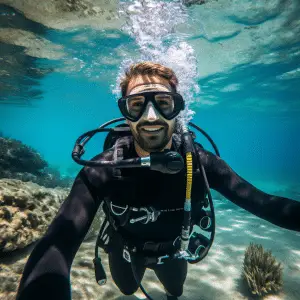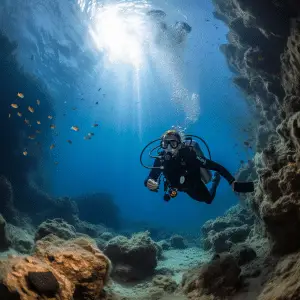Divers – novice or expert – must master skills and situational awareness. Doing so makes diving safe and enjoyable. Focus on building a strong foundation: buoyancy control, finning techniques, and mask clearing. These will help you move gracefully and last longer under the sea. Learn about diving physics and physiology too; this way you can avoid injuries like decompression sickness. Also, stay up-to-date with dive regulations and certifications to practice safe diving. Develop situational awareness too. Observe the environment, changes in sea conditions, marine life behavior, and other divers. This will help you make decisions and take action if something unexpected happens.
Understanding the importance of diving skills and situational awareness

Diving skills and situational awareness are essential for divers. These two abilities go together, to help divers navigate the underwater world safely and effectively. By honing their skills, divers can control buoyancy, streamline techniques, and maneuver effectively. Simultaneously, developing situational awareness enables them to spot risks and adjust to changing conditions.
As they refine diving skills, divers become aware of their surroundings. This helps them predict potential challenges like strong currents or limited visibility. They can also observe marine life and understand their habits, for a better experience and conservation efforts.
When underwater, divers need to master diving skills for safety. Training and practice help them execute maneuvers and control equipment. This helps them make the most out of their dive while minimizing risks.
Adaptation is central to diving. Conditions can change due to tides or weather, so divers must constantly assess their environment and adjust strategies. This ensures maximum safety and enjoyment.
Around 6 million people are certified divers, worldwide. This indicates the rising popularity of the sport across cultures and regions.
Assessing your current diving skills and situational awareness
Evaluating your diving abilities and situational awareness is important. Here’s a guide to help you:
- Reflect on your dives: Think about the challenges you faced and how you handled them. This will show you where you need improvement.
- Get feedback: Ask fellow divers or instructors for their advice. They will identify blind spots and offer tips.
- Practice scenarios: Put yourself in conditions that resemble real-life. See how you handle obstacles, emergencies and currents.
Plus, to improve your skills:
- Stay updated on techniques and safety protocols.
- Exercise for core strength, flexibility, and breath control.
- Dive with experienced partners.
By using these tips, you can become a confident diver. Remember: self-assessment, feedback, practice, knowledge, fitness and trusted partners are key.
Strengthening diving skills
If you want to take your diving skills to the next level, here are three steps to try:
- Perfect your technique. Focus on proper body positioning and control. Think about keeping your head in line with your spine and engaging your core muscles. Practice often to build muscle memory and coordination.
- Increase your fitness. Dive skills need strength, endurance, and flexibility. So, do exercises that focus on these areas. Strengthen your leg muscles for propulsion. Work on upper body strength for stability in the water. Stretch regularly for better maneuverability underwater.
- Boost situational awareness. Stay aware of your surroundings during dives. Check out potential hazards like currents or marine life behavior. Keep in touch with your dive buddy and learn underwater signaling techniques.
Don’t forget to stay up-to-date with diving knowledge. Consider joining advanced courses or specialty programs. These can include wreck diving or underwater photography.
Push yourself out of your comfort zone and enjoy the underwater world even more! Start exploring the depths today!
Enhancing situational awareness
Enhancing situational awareness is a must for divers. Some have shared amazing experiences of its impact. For example, one diver noticed an odd pattern in fish behavior near a coral reef. His raised awareness enabled him to spot a shark lurking close by. He quickly signaled his dive buddy and they both moved away from danger.
By boosting your situational awareness, you boost your diving skills. Plus, it makes your dives safer and more enjoyable for everyone.
To do this, dive with a buddy for increased safety and better situational awareness. Also, stay focused to remain alert and responsive to changes. Use visual cues as reference points to navigate. Finally, practice spatial awareness for judging distances underwater.
Incorporating dive exercises and simulations
Start by honing basic dive skills: buoyancy control and fin kicks. These help you learn the essentials for a smooth dive. Master neutral buoyancy, adjust underwater, and use different fin kicks to move.
Progress to more complicated dive exercises. Practice emergency ascents, say, if you run out of air or a piece of equipment fails. This will help you tackle unexpected emergencies underwater.
Include dive simulations in your routine. Use virtual reality or mock-ups to create real conditions and challenges. This sharpens your awareness and decision-making under the sea.
Yoga and breath-holding exercises also improve your lung capacity and physical fitness, leading to better diving skills.
A group of novices once tried emergency ascents in a safe environment. They managed their equipment calmly and efficiently. This exercise not only improved diving skills, but also gave them preparedness for an emergency.
By including these dive exercises and simulations, you’ll enhance your diving skills and awareness. Remember, practice makes perfect in scuba diving!
Maintaining physical fitness for diving

To boost diving skills and situational awareness underwater, physical fitness is a must. Optimal shape allows divers to navigate challenging conditions and perform better. Here are some essential points to consider:
- Cardiovascular Endurance: Swimming, running, or cycling are great for overall cardiovascular health, increasing stamina and prolonging time underwater.
- Strength Training: Weightlifting or resistance training builds muscle strength, aiding divers in carrying heavy equipment and moving easily in the water.
- Flexibility: Regular stretching routines help with flexibility and range of motion, reducing injury risk while diving.
- Core Stability: Core exercises like planks and yoga improve stability and control, essential for balance and precise movements while diving.
- Breathing Techniques: Controlled breathing techniques such as deep diaphragmatic breathing or meditation help conserve air and manage stress underwater.
- Hydration and Nutrition: Prior to diving, adequate hydration is key for optimal performance. Eating a balanced diet with lots of nutrients helps muscle recovery and energy levels.
Also, divers should have regular medical check-ups to detect any health issues early. Safety should be the number one priority when engaging in physical activity.
To maximize diving potential and boost safety, cross-training exercises mimicking the demands of diving are recommended. For example, improving grip strength is beneficial for holding onto equipment or potential hazards underwater.
By following these steps—cardiovascular endurance, strength training, flexibility exercises, core stability, breathing techniques, hydration and nutrition, plus cross-training—divers can significantly improve skills and situational awareness underwater. Physical fitness is essential for maximizing diving potential and ensuring overall safety.
Conclusion
Enhance your diving skills and awareness for a successful dive! Pay attention to details like buoyancy control, body positioning, and communication underwater. Practice in different conditions to gain experience and confidence.
Stay alert and aware of your surroundings. Monitor other divers and potential hazards. Get proper training, stay focused, and actively engage in dive planning.
Seek guidance from experienced divers or instructors. Join a dive club or take advanced courses to learn new techniques and challenges. This will help you improve your skills and awareness underwater.
Frequently Asked Questions
Q: How can I improve my diving skills?
A: To improve your diving skills, it is important to get proper training and practice regularly. Enroll in a certified diving course, learn from experienced instructors, and follow safety guidelines. Continuously practicing different diving techniques and perfecting your buoyancy control will enhance your skills.
Q: What are some tips for improving situational awareness while diving?
A: Situational awareness is crucial for safe diving. To improve it, always stay alert and focused on your surroundings. Maintain good communication with your diving buddy and pay attention to their signals. Regularly check your gauges, be aware of the dive plan, and continuously observe for potential hazards or changes in conditions.
Q: Are there any specific exercises to increase situational awareness?
A: Yes, certain exercises can help increase your situational awareness. Practice underwater navigation by setting up a simple route and using a compass or natural references. Conduct regular buddy checks to ensure equipment readiness and establish a habit of sharing information during the dive. Engage in simulated emergency drills to improve response capabilities during critical situations.
Q: How can I enhance my buoyancy control?
A: Buoyancy control is vital for the divers’ safety and minimizing damage to the underwater environment. Practice different buoyancy techniques such as breathing control, weight distribution, and utilizing your BCD (Buoyancy Control Device) effectively. Find the optimal balance to remain neutrally buoyant, conserving energy throughout the dive.
Q: What should I do to overcome fear or anxiety while diving?
A: Overcoming fear or anxiety in diving can be achieved through proper training, experience, and relaxation techniques. Gradually expose yourself to more challenging dives, always staying within your comfort zone. Maintain slow and controlled breathing, which helps relax the body and mind. Diving with a supportive buddy or joining a dive group can also increase confidence and ease anxiety.
Q: Is it necessary to review and learn from diving experiences?
A: Absolutely! Reviewing and learning from diving experiences is crucial for personal growth. After each dive, analyze your performance, identify areas for improvement, and learn from any mistakes made. Share experiences and learn from others in the diving community. Continuous learning is essential for advancing your diving skills and enhancing situational awareness.
